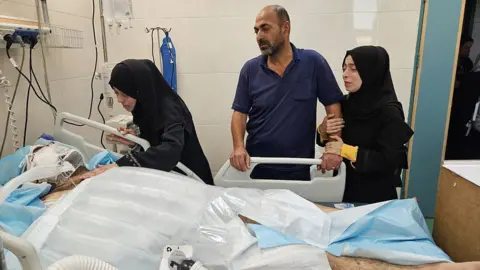In a deeply distressing incident emanating from Gaza, Hamdi al-Najjar, a father of nine, remains in critical condition following an Israeli airstrike that claimed the lives of nine of his ten children. The attack occurred on May 25, 2025, and has evoked widespread outrage and condemnation, not only from within Gaza but also from international organizations and observers. Reports indicate that Dr. Milena Angelova-Chee, a Bulgarian doctor at Nasser Hospital in Khan Younis, has been directly involved in treating Hamdi and confirmed that his life remains in jeopardy as he copes with significant injuries sustained during the strike.
The tragedy has devastated the al-Najjar family. The couple’s surviving son, 11-year-old Adam, also suffered injuries in the attack but is reportedly in stable condition. The airstrike, which the Israeli military claims is under review, has drawn criticism for the high civilian casualties, particularly highlighting the vulnerability of families living in conflict zones. The nine children—Yahya, Rakan, Raslan, Gebran, Eve, Rival, Sayden, Luqman, and Sidra—aged between a few months and 12 years, represent a heartbreaking loss for the al-Najjar family and the broader community, further deepening the humanitarian crisis in Gaza.
The incident is illustrative of the rising civilian death toll in the ongoing conflict, with the International Committee of the Red Cross (ICRC) drawing attention to the alarming fatality rates, including the deaths of two of its staff members in separate attacks on their homes. In recent days, escalating violence has claimed the lives of more than 23 individuals in Gaza, including a senior official from the territory’s civil emergency service and a journalist, whose families are now grappling with the aftermath of these assaults. The situation in Khan Younis is particularly precarious, with hospitals struggling to cope with the influx of casualties due to escalated airstrikes.
Dr. Angelova-Chee emphasized the collective trauma the medical staff and families endure in Gaza. She underscored that countless others share similar heartbreaking experiences, as the effects of 18 months of ongoing conflict have left the community in a perpetual state of alert and despair. Many families find themselves relocating frequently in search of safety, only to face renewed violence in their new locales. Israeli authorities, on the other hand, maintain that their military actions target those they deem threats in a region described as a “dangerous war zone.”
As the Israeli Defense Forces (IDF) continue air operations in the area, widespread displacement has been reported, exacerbating already dire conditions. Control measures have left approximately 81% of Gaza subject to Israeli evacuation orders or closed-off “no-go” zones—a reality that confines many residents without viable options for relocation. An Israeli blockade introduced earlier this year further complicates the humanitarian situation.
International organizations have raised alarms over the blockade’s implications for food security, accentuated by reports that aid delivery remains insufficient given the urgent needs of the Gazan populace, which has been compounded by ongoing military operations. The UN has called for a much larger influx of aid, estimating that between 500 to 600 trucks of supplies are necessary daily to meet basic needs.
The broader context is one of escalating violence. Since the October 7, 2023, attacks by Hamas, which resulted in substantial casualties on both sides, hostilities in Gaza have surged. Recent reports indicate that over 53,939 people, including approximately 16,500 children, have lost their lives in the accompanying Israeli military response.
As the immediate family of Hamdi al-Najjar copes with unimaginable loss and trauma, the global community watches closely, hoping for meaningful dialogue that could lead to a cessation of hostilities and a resolution to the humanitarian crisis, which continues to unfold with devastating impact on countless innocent lives.



